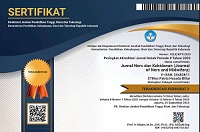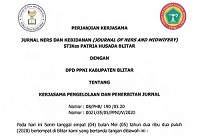Effect of Theory-Based Education on Diabetic Ulcer Prevention Among Diabetes Mellitus Patients
DOI:
https://doi.org/10.26699/jnk.v11i1.ART.p031-038Keywords:
theory-based education, diabetic ulcer, diabetes mellitus, preventionAbstract
Diabetic ulcers are one of the complications often experienced by patients with diabetes mellitus. The incidence of diabetic ulcers has an impact on patients, families, health care, and society in general. Education plays an important role in the prevention of diabetic ulcers. This study aims to analyze the effect of health education based on the theory of planned behavior on the main factors of theory of planned behavior (attitudes, subjective norms, perceived behavioral control), intentions and diabetic ulcer prevention in patients with diabetes mellitus. The quasi-experimental approach pre-test and post-test with control group design was used in this study. There were 84 patients with diabetes mellitus divided into intervention groups and control groups. Questionnaires are used to assess attitudes, subjective norms, perceived behavioral control, intentions, and behavior prevention of diabetic ulcers. The statistical analysis showed significant differences in attitudes, subjective norms, perceived behavioral control, intentions, and diabetic ulcers prevention between the intervention group and the control group (p=0,000). This research suggests that education based on the theory of planned behavior can enhance the construction of the Theory of Planned Behavior (attitude, subjective norms, perceived behavioral control), intention, and diabetic ulcer prevention in patients with diabetes mellitus. Patient behavior change strategies can be done by applying health education based on the theory of planned behavior.
References
Ajzen, I. (2010). TPB Questionnaire Construction 1 CONSTRUCTING A THEORY OF PLANNED BEHAVIOR QUESTIONNAIRE. Retrieved from https://people.umass.edu/aizen/pdf/tpb.measurement.pdf.
Ajzen, I. (2019). Theory of Planned Behavior Diagram. Retrieved January 14, 2019, from https://people.umass.edu/aizen/tpb.diag.html.
Anumah, F. O., Mshelia-Reng, R., Omonua, O. S., Mustapha, J., Shuaibu, R. A., & Odumodu, K. C. (2022). Impact of Diabetes Foot Care Education on Amputation Rate in the University of Abuja Teaching Hospital, Nigeria. International Journal of Lower Extremity Wounds, 21(3), 275–278. https://doi.org/10.1177/1534734620934578.
Ashrafi, E., Kasmaei, P., Mehrabian, F., Omidi, S., Zareban, I., Karimy, M., … Tonekaboni, N. R. (2020). The effect of educational program based on the theory of planned behavior on HIV prevention skills. HIV and AIDS Review, 19(3), 180–186. https://doi.org/10.5114/hivar.2020.99689.
Fayfman, M., Schechter, M. C., Amobi, C. N., Williams, R. N., Hillman, J. A. L., Alam, M. M., … Umpierrez, G. E. (2020). Barriers to diabetic foot care in a disadvantaged population: A qualitative assessment. Journal of Diabetes and Its Complications, 34(12), 107688. https://doi.org/10.1016/j.jdiacomp.2020.107688.
Gholipour-Baboli, A., Toranjinejad, A., Gilasi, H. R., Moravejy, S. A., Gharlipour, Z., & Ramezani, T. (2017). Effect of educational program on milk consumption based on the theory of planned behavior among girl students. International Journal of Pediatrics, 5(4), 4793–4802. https://doi.org/10.22038/ijp.2016.7707.
Hadi Sulistyo, A. A., Sae Sia, W., & Maneewat, K. (2018). The effect of a foot care camp on diabetic foot care knowledge and the behaviours of individuals with diabetes mellitus. Journal of Research in Nursing, 23(5), 416–425. https://doi.org/10.1177/1744987118765903.
Hajivandi, L., Noroozi, M., Mostafavi, F., & Ekramzadeh, M. (2021). Assessing the impact of an educational intervention program based on the theory of planned behavior on the nutritional behaviors of adolescents and young adults with PCOS in Iran: a field trial study. BMC Pediatrics, 21(1), 1–10. https://doi.org/10.1186/s12887-021-02784-z.
Hosseini, S. S., Shamsi, M., Khorsandi, M., & Moradzadeh, R. (2021). The effect of educational program based on theory of planned behavior on promoting retinopathy preventive behaviors in patients with type 2 diabetes: RCT. BMC Endocrine Disorders, 21(1), 1–7. https://doi.org/10.1186/s12902-021-00680-2.
Hüsers, J., Hafer, G., Heggemann, J., Wiemeyer, S., John, S. M., & Hübner, U. (2020). Predicting the amputation risk for patients with diabetic foot ulceration - A Bayesian decision support tool. BMC Medical Informatics and Decision Making, 20(1), 1–10. https://doi.org/10.1186/s12911-020-01195-x
IDF. (2023). IDF Strategic Plan. International Diabetes Federation.
International Diabetes Federation (IDF). (2021). IDF Diabetes Atlas 10th edition. Diabetes Research and Clinical Practice (Vol. 102). https://doi.org/10.1016/j.diabres.2013.10.013.
IWGDF. (2023a). Guidelines on the prevention of foot ulcers in persons with diabetes IWGDF 2023 update.
IWGDF. (2023b). Practical guidelines on the prevention and management of disease IWGDF 2023 update.
Khani Jeihooni, A., Jormand, H., Saadat, N., Hatami, M., Abdul Manaf, R., & Afzali Harsini, P. (2021). The application of the theory of planned behavior to nutritional behaviors related to cardiovascular disease among the women. BMC Cardiovascular Disorders, 21(1), 1–11. https://doi.org/10.1186/s12872-021-02399-3.
Marashi, T., Safari-Moradabadi, A., Ahmadi, F., & Alipour-Anbarani, M. (2022). The effect of education based on the theory of planned behavior on the promotion of physical activity and knowledge of students about diabetes prevention. International Journal of Health Promotion and Education, 60(6), 316–328. https://doi.org/10.1080/14635240.2020.1854814.
Mokarrami, E., Jalili, Z., & Ghouchani, H. T. (2019). The Effect of Education Based on the Theory of Planned Behavior on Preventive Behaviors of Vaginitis in Health Ambassadors. Iranian Journal of Health Education and Health Promotion, 7(2), 211–219. https://doi.org/10.30699/ijhehp.7.2.211.
PERKENI. (2021). Pedoman Pengelolaan Dan Pencegahan Diabetes Mellitus Tipe 2 Di Indonesia 2021.
Rahimdel, T., Morowatisharifabad, M. A., Salehi-Abargouei, A., Mirzaei, M., & Fallahzadeh, H. (2019). Evaluation of an education program based on the theory of planned behavior for salt intake in individuals at risk of hypertension. Health Education Research, 34(3), 268–278. https://doi.org/10.1093/her/cyz007.
Sekhar, M. S., Thomas, R. R., Unnikrishnan, M. ., Vijayanarayana, K., & Sunil, R. G. (2015). Impact of diabetic foot ulcer on health-related quality of life: A cross-sectional study. Seminars in Vascular Surgery, 28(3–4), 165–171. https://doi.org/10.1053/j.semvascsurg.2015.12.001.
Siuki, H. A., Peyman, N., Vahedian-Shahroodi, M., Gholian-Aval, M., & Tehrani, H. (2019). Health Education Intervention on HIV/AIDS Prevention Behaviors among Health Volunteers in Healthcare Centers: An Applying the Theory of Planned Behavior. Journal of Social Service Research, 45(4), 582–588. https://doi.org/10.1080/01488376.2018.1481177.
Stolt, M., Gattinger, H., Boström, C., & Suhonen, R. (2020). Foot health educational interventions for patients and healthcare professionals: A scoping review. Health Education Journal, 79(4), 390–416. https://doi.org/10.1177/0017896919888952.
Sukartini, T., Dee, T. M. ., Probowati, R., & Arifin, H. (2020). Behaviour model for diabetic ulcer prevention. Journal of Diabetes and Metabolic Disorders, 19(1). https://doi.org/10.1007/s40200-019-00484-1.
Syed, M. H., Salata, K., Hussain, M. A., Zamzam, A., de Mestral, C., Wheatcroft, M., … Al-Omran, M. (2020). The economic burden of inpatient diabetic foot ulcers in Toronto, Canada. Vascular, 28(5), 520–529. https://doi.org/10.1177/1708538120923420.
Tekir, Ö., Çevik, C., & Özsezer, G. (2019). The Effects of Education on Foot Care Behaviors and Self‑Efficacy in Type 2 Diabetes Patients. Nigerian Journal of Clinical Practice, 22, 1070–1077. https://doi.org/10.4103/njcp.njcp.
The International Working Group on the Diabetic Foot. (2023). Practical Guidelines 7 Guidelines Development and methodology IWGDF Guidelines on the prevention and management of diabetes-related foot disease IWGDF Guidelines. Retrieved from www.iwgdfguidelines.org.
Zeidi, I. M., Morshedi, H., & Otaghvar, H. A. (2021). A theory of planned behavior-enhanced intervention to promote health literacy and self-care behaviors of type 2 diabetic patients. Journal of Preventive Medicine and Hygiene, 61(4), E601–E613. https://doi.org/10.15167/2421-4248/jpmh2020.61.4.1504.
Zhang, Y., Lazzarini, P. A., McPhail, S. M., van Netten, J. J., Armstrong, D. G., & Pacella, R. E. (2020). Global disability burdens of diabetes-related lower-extremity complications in 1990 and 2016. Diabetes Care, 43(5), 964–974. https://doi.org/10.2337/dc19-1614.
Downloads
Published
How to Cite
Issue
Section
License
Copyright (c) 2024 Jurnal Ners dan Kebidanan (Journal of Ners and Midwifery)

This work is licensed under a Creative Commons Attribution-ShareAlike 4.0 International License.






